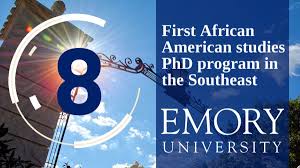Ph.D. in African American Studies: Introduction, Admission, Registration, Eligibility, Duration, Fees, Syllabus 2024

Introduction:
The pursuit of a Ph.D. in African American Studies is a profound journey into the historical, cultural, and social dynamics of African American experiences. This interdisciplinary field offers scholars the opportunity to explore and contribute to a deeper understanding of African American history, culture, and the ongoing quest for social justice.
Admission Process:
- Application Submission: Prospective students must submit a detailed application, usually by December .
- Statement of Purpose: A 600-750 word essay articulating research interests and academic goals is required.
- Writing Sample: An 18-25 page sample showcasing the applicant’s research and writing skills.
- Letters of Recommendation: Three letters from academic referees who can attest to the applicant’s scholarly potential.
- Transcripts and CV: Official transcripts from previous academic institutions and a current curriculum vitae are necessary.
- Interviews: Selected candidates may be invited for interviews as part of the evaluation process.
Eligibility:
- Undergraduate Degree: Completion of an undergraduate degree is mandatory.
- Knowledge of African American History: Applicants should demonstrate a solid understanding of African American history and culture.
- Research Experience: Prior research experience in a related field is highly advantageous.
- Foreign Language Proficiency: Proficiency in a foreign language may be required, depending on the program.
- Academic Record: A strong academic record with a focus on relevant coursework is essential.
- Interdisciplinary Interest: An interest in interdisciplinary approaches to African American Studies is encouraged.
Completion Time:
The typical duration for completing a Ph.D. in African American Studies is approximately five years, allowing for coursework, comprehensive exams, and dissertation research.
Career Opportunities:
- Academia: Many graduates pursue careers as professors and researchers in universities.
- Cultural Work: Opportunities exist in museums, archives, and cultural institutions.
- Public Policy: Graduates can influence policy-making related to African American communities.
- International Development: Some find roles in international agencies focusing on development and advocacy.
- Education: Positions in educational administration and curriculum development are common.
- Consultancy: Expertise in African American Studies is valuable for consultancy roles in various sectors.
Syllabus:
- History, Politics, and Theory: Courses covering the institutional and theoretical aspects of African culture.
- Literary, Expressive, and Performance Cultures: Study of visual culture, performance, and literary arts.
- Feminism, Gender, and Sexuality: Exploration of feminist consciousness and gender constructions within the African World.
- Critical Race Theory: Understanding the role of race in political economy and class formation.
- African Diaspora Studies: Examination of the life and culture of persons of African descent globally.
- Interdisciplinary Research Methods: Training in various research methodologies applicable to African American Studies.
Internship Opportunities:
- Research Internships: Positions that offer hands-on experience in human rights and African American Studies research.
- Museum Internships: Opportunities to work in institutions like the National Museum of African American History and Culture.
- Diplomatic Security Fellowships: Programs preparing students for careers in foreign service and security.
- Cultural Preservation: Internships focused on the preservation and curation of African art and cultural artifacts.
- Educational Programs: Teaching and educational development roles in various educational institutions.
- Policy Advocacy: Internships that involve policy analysis and advocacy for African American communities.
Scholarships and Grants:
- University Fellowships: Many institutions offer full tuition and living stipends for doctoral candidates.
- Research Grants: Funding for dissertation research, fieldwork, and language study.
- External Scholarships: Opportunities like the AAA Dissertation Fellowship and AACAP Jeanne Spurlock Research Fellowship.
- Diversity Grants: Specific grants aimed at increasing diversity and representation in academia.
- Travel Awards: Scholarships that support travel for research and academic conferences.
- Teaching Assistantships: Positions that provide a stipend in exchange for teaching responsibilities.
FAQs:
What is the focus of a Ph.D. in African American Studies?
The focus is on the comprehensive study of African American history, culture, and social issues through an interdisciplinary lens.
Can I pursue a Ph.D. in African American Studies part-time?
Most programs are designed for full-time study to ensure a cohesive and immersive educational experience.
Are there online Ph.D. programs in African American Studies?
While rare, some institutions may offer online or hybrid formats. It’s best to check with individual programs.
What kind of research opportunities are available during the Ph.D. program?
Students can engage in various research projects, often with opportunities for fieldwork and archival research.
How can I fund my Ph.D. in African American Studies?
Funding can come from university fellowships, external scholarships, teaching assistantships, and research grants.
